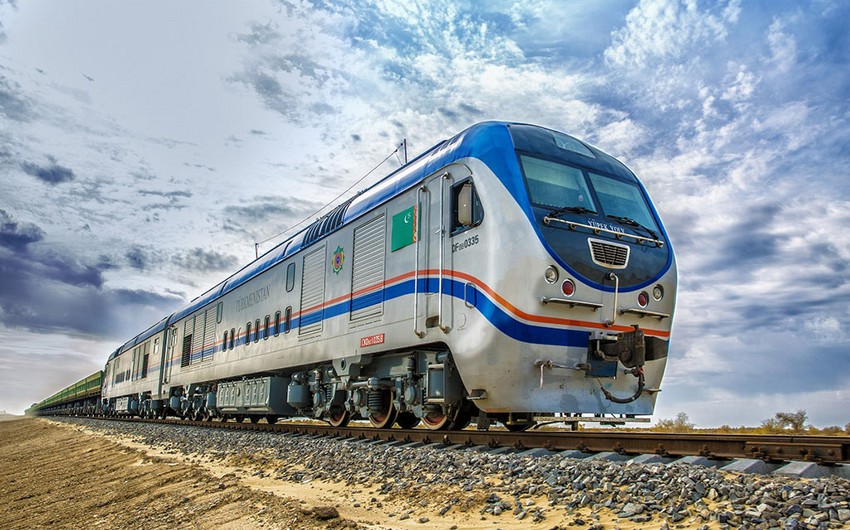Russian Prime Minister Mikhail Mishustin signed an order of consent to Turkmenistan’s accession to the agreement on the International North-South Transport Corridor (INSTC).
"To accept the proposal of the Russian Transport Ministry, agreed with the Russian Foreign Ministry and other interested executive authorities, on the expression by of consent the Russian side to Turkmenistan's accession to the agreement on the North-South International Transport Corridor," TASS reported on July 11, citing the document.
The Russian Foreign Ministry was also instructed to notify Iran of its consent to Turkmenistan's accession to the agreement.
Earlier, Turkmenistan announced plans to become a participant in the project.
In May, Director General of the Agency for Transport and Communications under the Turkmen Cabinet of Ministers Mammetkhan Chakiyev pointed out the great potential of his country in the logistics of transit flows, especially taking into account the Kazakhstan-Turkmenistan-Iran railway, which is the eastern branch of the INSTC.
"The possibility of using another direction is being developed – through the Artyk station on Turkmenistan's Ashgabat-Mary line, where a private cargo terminal for transshipment of goods between rail and road transport was built and is functioning. In the development of the multimodal transportation, Turkmenistan is also working to provide preferential conditions for drivers, including simplified visa rules and tariffs," Chakiyev said at the 14th annual "Russia-Islamic World: Kazan Forum 2023" on May 18.
He added that currently the main flow of cargo transportation along the North-South Corridor in Turkmenistan passes through the southern border crossing with Iran, at Sarakhs (Iran). But there is also the Akayla (Turkmenistan)-Inche Burun (Iran) crossing in the west, which can increase transit volumes.
The intergovernmental agreement on the creation of a multimodal INSTC was signed by Russia, India and Iran in 2000. Later, the list of participants expanded to 14.
The INSTC is a multimodal network spanning 7,200 kilometers of ship, rail, and road routes. It is designed to provide the shortest multi-modal transportation route linking the Indian Ocean and the Persian Gulf to the Caspian and Baltic Seas.
Compared to the sea route via the Suez Canal, the INSTC reduces the distance by more than half, resulting in lower transportation costs and shorter transit times. In addition, the INSTC provides an alternative connectivity initiative to countries in the Eurasian region and reduces the time and cost for the transfer of goods from India to Russia and Europe.
The first container train left the Chelyabinsk-Gruzovoy station of the South Urals Railway in Russia for Saudi Arabia in late June. The train runs along the INSTC through Kazakhstan, Turkmenistan and Iran.
The South Urals Railway sent a container train to India along the INSTC two months ago. It is planned to send two container trains from Russia's Chelyabinsk Region monthly along the North-South corridor beginning from the third quarter of this year.
In April 2022, the railway companies of Russia, Kazakhstan, and Turkmenistan signed a memorandum to establish a joint venture that will concentrate on transportation development.
The sides agreed to combine their competencies to form competitive tariff rates and “seamless” transportation of goods from Kazakhstan, Russia, Turkmenistan to Iran, India, the countries of the Middle East and the Asia-Pacific region with the participation of Aksaraiskaya, Ozinki, Bolashak, Inche-Burun, Serakhs border crossings and in the opposite direction.
The joint venture will operate rail freight services on the eastern branch of the INSTC.
The INSTC currently unites multiple transport systems across various countries, with Russia and Iran being the two countries contributing the most to the infrastructure development projects, accounting for 34.6 percent and 33.7 percent of total planned investments, respectively. Kazakhstan has a 16.5 percent share of investment in the INSTC's development.
Recent statistics indicate that over 0.6 million tons of cargo were transported from the stations of the northern railways along the INSTC in 2022. It is projected that by 2030, the volume of Russian cargo transported through the INSTC will double from 17 million tonnes to 32 million tonnes.







 President Ilham Aliyev shed light on the evolving contours of the peace process with Armenia during an international conference in Baku this week. ...
President Ilham Aliyev shed light on the evolving contours of the peace process with Armenia during an international conference in Baku this week. ...
 Azerbaijan and Armenia started the process of demarcation of their border on Tuesday, with the installation of the first border markers based on ge...
Azerbaijan and Armenia started the process of demarcation of their border on Tuesday, with the installation of the first border markers based on ge...
 Armenian sappers commenced on Monday mine-clearance operations in the territories adjacent to the Saint Mary Church in village of Voskepar (Armenia...
Armenian sappers commenced on Monday mine-clearance operations in the territories adjacent to the Saint Mary Church in village of Voskepar (Armenia...
 Iran and Pakistan have signed eight cooperation documents in various fields, and agreed to strengthen ties to fight terrorism in the region.
Iran and Pakistan have signed eight cooperation documents in various fields, and agreed to strengthen ties to fight terrorism in the region.
 President Aliyev emphasized the critical role of the North-South Transport Corridor in fostering transport cooperation between Azerbaijan and Russi...
President Aliyev emphasized the critical role of the North-South Transport Corridor in fostering transport cooperation between Azerbaijan and Russi...



